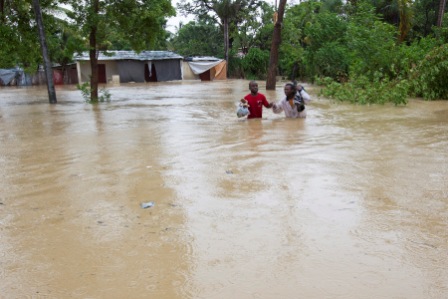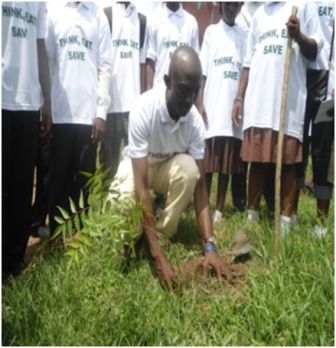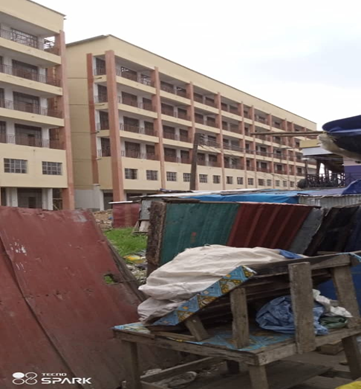Floods: Stemming the tide in West Africa
Every year West African citizens experience heavy downpours, which often result in flooding. The floods in turn bring death, destruction to property and crops and outbreaks of disease. In 2012, the situation worsened dramatically. And the United Nations warns that climate change, increasing urbanization and population growth will further exacerbate the impact of floods in the future.
In Nigeria, 363 people died by the end of October in the worst flooding in that country in 50 years. Some 2 million people were displaced and 618,000 houses were destroyed. In neighbouring Niger, floods killed 65 people and 125,000 others were rendered homeless. Deaths and destruction were reported in Senegal and other West African countries as well. According to the World Meteorological Organization total rainfall in 2012 was 150 per cent above normal levels in Mali, Senegal, northern Burkina Faso and the Lake Chad basin countries of Niger, Nigeria and Cameroon. Rheal Drisdalle of Plan International, a children’s development organization, says that the floods burst the banks of the Niger River, which reached levels “not seen since the 1920s.”
To their credit, soon after the flooding began, authorities in West Africa promptly made appeals and led relief efforts. To supplement the efforts of local and international relief agencies, the Nigerian government allocated $110 million out of its own resources, while that of Niger delivered 1,400 tonnes of food supplies. Observers commended those efforts, but criticized the poor state of flood preparedness.
The UN recommends that countries devise robust programmes to forecast and respond to floods, in order to minimize their impact by organizing prevention, improving planning and speeding reaction times. Such programmes would also help relief agencies coordinate aid distribution more effectively.
According to Jamal Saghir, the director of the World Bank’s sustainable development department for Africa, “recent events signal a clear need to refocus efforts on flood prevention, not just response.”
Unpredictable weather patterns are here to stay, adds Dewald van Niekerk, director of African disaster studies at South Africa’s North-West University. “What needs to change is our work in pre-disaster preparation,” he says. “People have to understand why it floods. There might be an engineering solution … or there could be an early warning system.”
However, many West African countries have yet to establish such prevention systems. The Nigerian Meteorological Agency says that it had been predicting severe flooding since March 2012 and advised the authorities to clear up drainage canals. Its director, Anthony Anuforo, expressed outrage that no one heeded the advice.
But the director-general of Nigeria’s National Emergency Management Agency, Muhammad Sani Sidi, has spread the blame around. His agency was hamstrung by the inefficiency of the police and health departments, he says, adding that most states lacked enough trained personnel or had no ambulances or fire extinguishers.
Throughout the region, there has also been criticism of the poor condition of physical infrastructure. “In Senegal corruption is one of the reasons for this state of affairs, because works that are carried out have in many cases not gone through a bidding process,” says Mouhamadou Mbodj, coordinator of Forum Civil, the Senegalese chapter of the international anti-corruption organization Transparency International. In Niger, Ibrahim Abdoulaye, a political observer, adds that substandard dams collapsed “under the pressure of heavy rainfall.”
The inadequacy of prevention and mitigation measures in Nigeria, Niger and Senegal mirrors the situation in most other West African countries. “Why wait for disaster to strike before taking action?” asks journalist Mohamane Mourtala Moussa in Niger. “No country in this region of Africa has yet produced an effective flood prevention plan.”
Some African countries have become more proactive in disaster management. South Africa passed a Disaster Management Act in 2002 that mandates national, provincial and municipal authorities to devise plans, including for prevention and mitigation.
In 2012, authorities in Côte d’Ivoire took pre-emptive measures by ordering 6,000 families in flood-prone areas of Abidjan, the capital, to relocate and gave them $300 each to do so. The move helped save lives. According to Fiacre Kili, the director of the national office for civilian protection, “Previous rainy seasons have caused deaths in certain districts because of landslides, rock-falls and flooding. … That is why we have taken measures to ensure no human life is lost.”
For the moment, however, the victims of the recent flooding elsewhere in West Africa are still awaiting relief. They are not hearing the high-sounding notes coming from international organizations and civil society leaders about programmes to prevent or mitigate future flooding.
By Kingsley Ighobor, Africa Renewal
http://www.un.org/africarenewal/web-features/floods-stemming-tide-west-africa
Stay with Sierra Express Media, for your trusted place in news!
© 2013, https:. All rights reserved.






